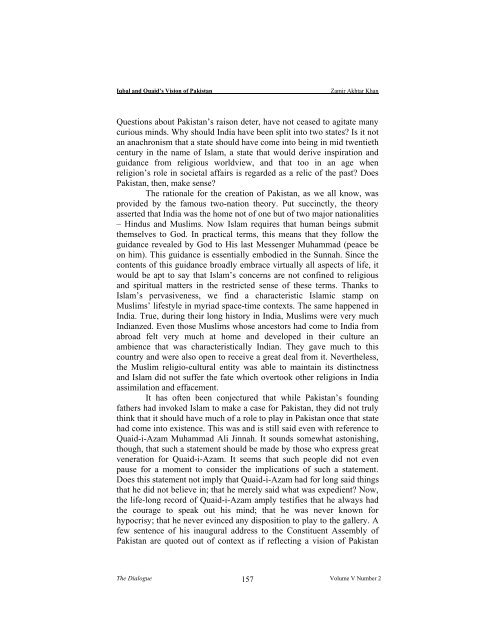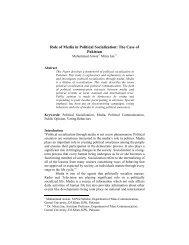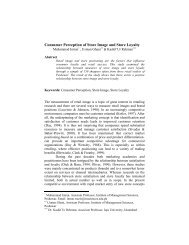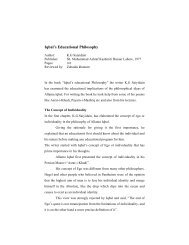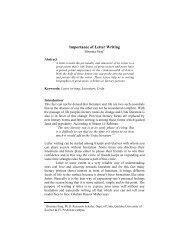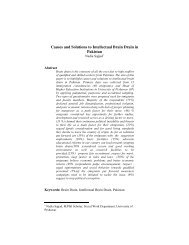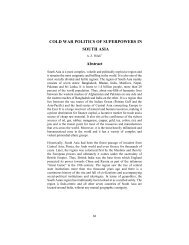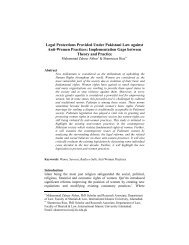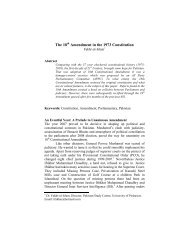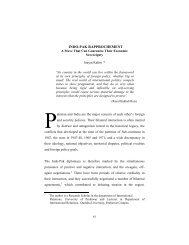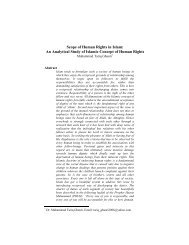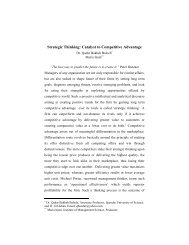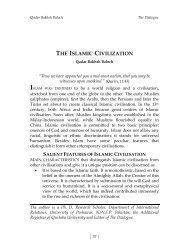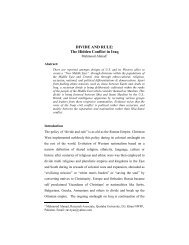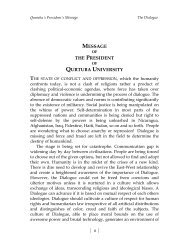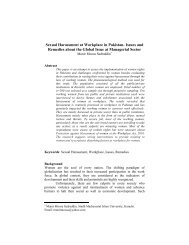Iqbal and Quaid's Vision of Pakistan - Qurtuba University of Science ...
Iqbal and Quaid's Vision of Pakistan - Qurtuba University of Science ...
Iqbal and Quaid's Vision of Pakistan - Qurtuba University of Science ...
You also want an ePaper? Increase the reach of your titles
YUMPU automatically turns print PDFs into web optimized ePapers that Google loves.
<strong>Iqbal</strong> <strong>and</strong> Quaid’s <strong>Vision</strong> <strong>of</strong> <strong>Pakistan</strong> Zamir Akhtar Khan<br />
Questions about <strong>Pakistan</strong>’s raison deter, have not ceased to agitate many<br />
curious minds. Why should India have been split into two states? Is it not<br />
an anachronism that a state should have come into being in mid twentieth<br />
century in the name <strong>of</strong> Islam, a state that would derive inspiration <strong>and</strong><br />
guidance from religious worldview, <strong>and</strong> that too in an age when<br />
religion’s role in societal affairs is regarded as a relic <strong>of</strong> the past? Does<br />
<strong>Pakistan</strong>, then, make sense?<br />
The rationale for the creation <strong>of</strong> <strong>Pakistan</strong>, as we all know, was<br />
provided by the famous two-nation theory. Put succinctly, the theory<br />
asserted that India was the home not <strong>of</strong> one but <strong>of</strong> two major nationalities<br />
– Hindus <strong>and</strong> Muslims. Now Islam requires that human beings submit<br />
themselves to God. In practical terms, this means that they follow the<br />
guidance revealed by God to His last Messenger Muhammad (peace be<br />
on him). This guidance is essentially embodied in the Sunnah. Since the<br />
contents <strong>of</strong> this guidance broadly embrace virtually all aspects <strong>of</strong> life, it<br />
would be apt to say that Islam’s concerns are not confined to religious<br />
<strong>and</strong> spiritual matters in the restricted sense <strong>of</strong> these terms. Thanks to<br />
Islam’s pervasiveness, we find a characteristic Islamic stamp on<br />
Muslims’ lifestyle in myriad space-time contexts. The same happened in<br />
India. True, during their long history in India, Muslims were very much<br />
Indianzed. Even those Muslims whose ancestors had come to India from<br />
abroad felt very much at home <strong>and</strong> developed in their culture an<br />
ambience that was characteristically Indian. They gave much to this<br />
country <strong>and</strong> were also open to receive a great deal from it. Nevertheless,<br />
the Muslim religio-cultural entity was able to maintain its distinctness<br />
<strong>and</strong> Islam did not suffer the fate which overtook other religions in India<br />
assimilation <strong>and</strong> effacement.<br />
It has <strong>of</strong>ten been conjectured that while <strong>Pakistan</strong>’s founding<br />
fathers had invoked Islam to make a case for <strong>Pakistan</strong>, they did not truly<br />
think that it should have much <strong>of</strong> a role to play in <strong>Pakistan</strong> once that state<br />
had come into existence. This was <strong>and</strong> is still said even with reference to<br />
Quaid-i-Azam Muhammad Ali Jinnah. It sounds somewhat astonishing,<br />
though, that such a statement should be made by those who express great<br />
veneration for Quaid-i-Azam. It seems that such people did not even<br />
pause for a moment to consider the implications <strong>of</strong> such a statement.<br />
Does this statement not imply that Quaid-i-Azam had for long said things<br />
that he did not believe in; that he merely said what was expedient? Now,<br />
the life-long record <strong>of</strong> Quaid-i-Azam amply testifies that he always had<br />
the courage to speak out his mind; that he was never known for<br />
hypocrisy; that he never evinced any disposition to play to the gallery. A<br />
few sentence <strong>of</strong> his inaugural address to the Constituent Assembly <strong>of</strong><br />
<strong>Pakistan</strong> are quoted out <strong>of</strong> context as if reflecting a vision <strong>of</strong> <strong>Pakistan</strong><br />
The Dialogue 157<br />
Volume V Number 2


